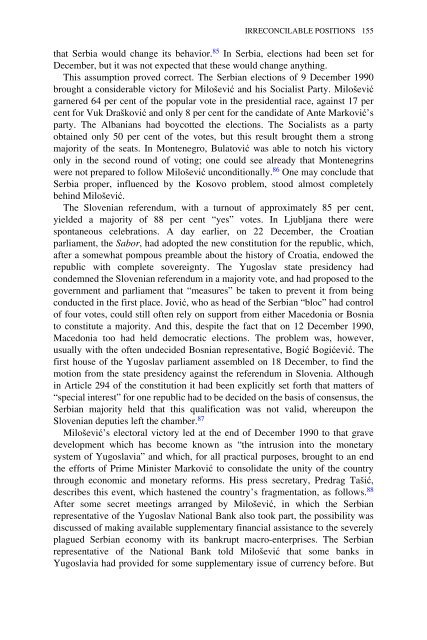Yugoslavia: A History of its Demise - Indymedia
Yugoslavia: A History of its Demise - Indymedia
Yugoslavia: A History of its Demise - Indymedia
Create successful ePaper yourself
Turn your PDF publications into a flip-book with our unique Google optimized e-Paper software.
IRRECONCILABLE POSITIONS 155<br />
that Serbia would change <strong>its</strong> behavior. 85 In Serbia, elections had been set for<br />
December, but it was not expected that these would change anything.<br />
This assumption proved correct. The Serbian elections <strong>of</strong> 9 December 1990<br />
brought a considerable victory for Milošević and his Socialist Party. Milošević<br />
garnered 64 per cent <strong>of</strong> the popular vote in the presidential race, against 17 per<br />
cent for Vuk Drašković and only 8 per cent for the candidate <strong>of</strong> Ante Marković’s<br />
party. The Albanians had boycotted the elections. The Socialists as a party<br />
obtained only 50 per cent <strong>of</strong> the votes, but this result brought them a strong<br />
majority <strong>of</strong> the seats. In Montenegro, Bulatović was able to notch his victory<br />
only in the second round <strong>of</strong> voting; one could see already that Montenegrins<br />
were not prepared to follow Milošević unconditionally. 86 One may conclude that<br />
Serbia proper, influenced by the Kosovo problem, stood almost completely<br />
behind Milošević.<br />
The Slovenian referendum, with a turnout <strong>of</strong> approximately 85 per cent,<br />
yielded a majority <strong>of</strong> 88 per cent “yes” votes. In Ljubljana there were<br />
spontaneous celebrations. A day earlier, on 22 December, the Croatian<br />
parliament, the Sabor, had adopted the new constitution for the republic, which,<br />
after a somewhat pompous preamble about the history <strong>of</strong> Croatia, endowed the<br />
republic with complete sovereignty. The Yugoslav state presidency had<br />
condemned the Slovenian referendum in a majority vote, and had proposed to the<br />
government and parliament that “measures” be taken to prevent it from being<br />
conducted in the first place. Jović, who as head <strong>of</strong> the Serbian “bloc” had control<br />
<strong>of</strong> four votes, could still <strong>of</strong>ten rely on support from either Macedonia or Bosnia<br />
to constitute a majority. And this, despite the fact that on 12 December 1990,<br />
Macedonia too had held democratic elections. The problem was, however,<br />
usually with the <strong>of</strong>ten undecided Bosnian representative, Bogić Bogićević. The<br />
first house <strong>of</strong> the Yugoslav parliament assembled on 18 December, to find the<br />
motion from the state presidency against the referendum in Slovenia. Although<br />
in Article 294 <strong>of</strong> the constitution it had been explicitly set forth that matters <strong>of</strong><br />
“special interest” for one republic had to be decided on the basis <strong>of</strong> consensus, the<br />
Serbian majority held that this qualification was not valid, whereupon the<br />
Slovenian deputies left the chamber. 87<br />
Milošević’s electoral victory led at the end <strong>of</strong> December 1990 to that grave<br />
development which has become known as “the intrusion into the monetary<br />
system <strong>of</strong> <strong>Yugoslavia</strong>” and which, for all practical purposes, brought to an end<br />
the efforts <strong>of</strong> Prime Minister Marković to consolidate the unity <strong>of</strong> the country<br />
through economic and monetary reforms. His press secretary, Predrag Tašić,<br />
describes this event, which hastened the country’s fragmentation, as follows. 88<br />
After some secret meetings arranged by Milošević, in which the Serbian<br />
representative <strong>of</strong> the Yugoslav National Bank also took part, the possibility was<br />
discussed <strong>of</strong> making available supplementary financial assistance to the severely<br />
plagued Serbian economy with <strong>its</strong> bankrupt macro-enterprises. The Serbian<br />
representative <strong>of</strong> the National Bank told Milošević that some banks in<br />
<strong>Yugoslavia</strong> had provided for some supplementary issue <strong>of</strong> currency before. But
















